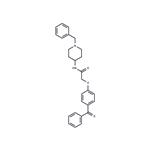Description
Adiponectin expressed by adipocytes exerts antidiabetic effects by binding to adiponectin receptor (AdipoR)1, which activates AMPK pathways, and AdipoR2, which activates PPARα pathways. AdipoRon is an orally active small molecule AdipoR agonist that binds AdipoR1 and AdipoR2 with K
D values of 1.8 and 3.1 μM, respectively. At 50 mg/kg, it acts similarly to adiponectin, activating AMPK and PPARα pathways and reducing insulin resistance and glucose intolerance in wild type mice fed a high-
fat diet and in genetically obese
db/db mice.
Uses
AdipoRon is an AdipoR agonist and activates AMPK and PPAR-α pathways in the muscle and liver. AdipoRon ameliorated diabetes of genetically obese rodent model db/db mice, and prolonged the shortened lifespan of db/db mice on a high-fat diet. AdipoRon is a promising therapeutic approach for the treatment of obesity-related diseases such as type 2 diabetes.
Biochem/physiol Actions
AdipoRon is an adiponectin agonist that binds to and activates adiponectin receptors AdipoR1 and AdipoR2, activating AMPK and PPAR-α pathways, and ameliorating insulin resistance and glucose intolerance in mice fed a high-fat diet in a manner similar to adiponectin itself. AdipoRon did not affect body weight, but did increase the expression of genes involved in fatty-acid oxidation, decreased tissue triglyceride content, and prolonged the shortened lifespan of db/db mice.
References
1) Okada-Iwabu?et al. (2013),?A small-molecule AdipoR agonist for type 2 diabetes and short life obesity; Nature 503?493
2) Fairaq?et al.?(2017),?AdipoRon, an adiponectin receptor agonist, attenuates PDGF-induced VSMC proliferation through inhibition of mTOR signaling independent of AMPK: Implications toward suppression of neointimal hyperplasia; Pharmacol. Res.?119?289




